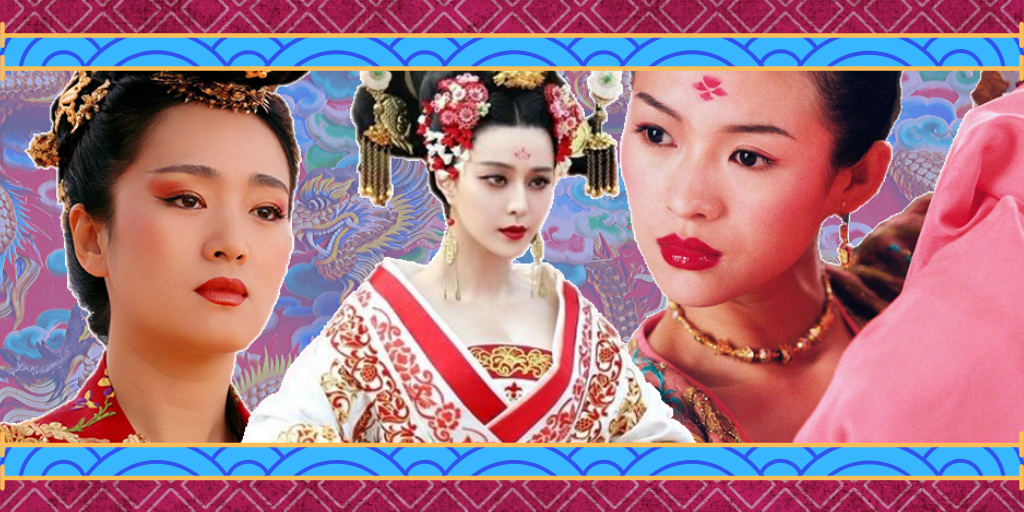Beware of spoilers!
Even though we might not be able to see Mulan this month because of the coronavirus outbreak, we can still take part in the beauty of the time period Mulan is frequently associated with—the Tang Dynasty.
As we’ve seen in the trailers, Disney’s reboot of Mulan, like the 1998 original animated film, is set in the Tang Dynasty. But in truth, The Ballad of Mulan was written during the Northern Wei Dynasty (386 A.D.-534 A.D.) and features the hallmarks that we Westerners have come to know about Mulan and her story, such as her taking the place of her aging father in battle and becoming the hero of China. While her story wasn’t written in the Tang Dynasty (618 A.D.-907 A.D.), she is often associated with the time period thanks to Sui Tang Romance, written in 1675 and released in 1695, during the Qing Dynasty.
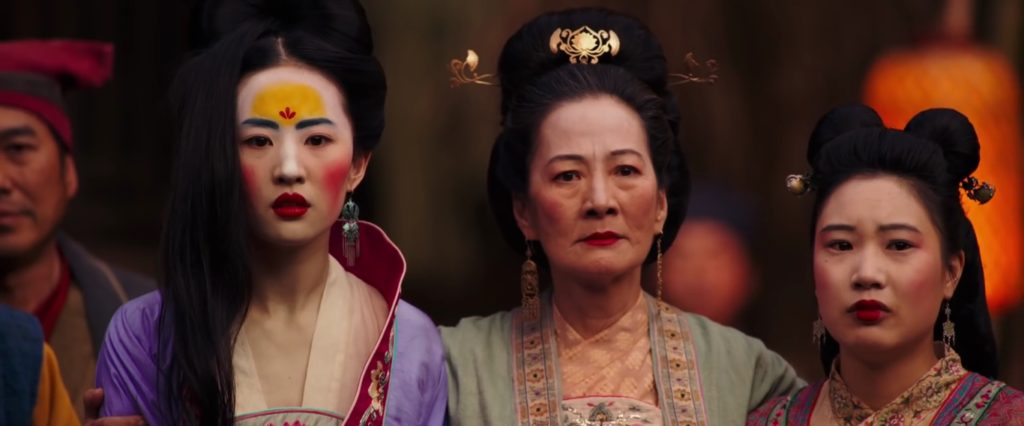
According to SyFyWire and Wikipedia, Sui Tang Romance is set at the beginning of the Tang Dynasty and finds Mulan meeting “another female warrior named Dou Xianniang,” the daughter of Xia king Duo Jiande, and “becomes Mulan bonded sister, or laotong.” While other versions of the story have Mulan serve and return home victoriously, Sui Tang Romance finds Mulan facing tragedy. The king makes the error of siding against the Tang Emperor and is defeated by him. Mulan and Xianniang surrender and offer to be put to death in place of the king, but after witnessing their filial piety, the Emperor and his mother are won over and allow Mulan and Xianniang to continue their lives and aspirations—for Xianniang, it was to marry general Luó Chéng and for Mulan, it was to go back to her parents and relocate her family to Xianniang’s capital of Leshou. The Emperor’s mother gives Mulan money to return home, but Mulan learns her father has died while she was away, and her mother has remarried. Mulan is then ordered to become one of the concubines of Heshana Khan. But instead of adhering to the orders, she dies by suicide instead of choosing to serve a foreign king.
It’s fitting that Mulan’s story is constantly set during the Tang Dynasty, a time when women had more power and agency than other times in ancient Chinese history. According to Tang Dynasty Global Studies, women in the Tang Dynasty had “relative freedom” and lived “at a time characterized by open-mindedness and liberal ideas.” The site also mentions that women during this time “had a chance to learn history, politics, and military skills.”
“At the founding of this dynasty, Princess Pingyang personally participated in battles, having led a detachment of women to help her father, Emperor Gaozu,” states the site. “Princess Taiping, daughter of Emperor Gaozong, twice suppressed mutinies inside the imperial court at critical times. Living within a relaxed social environment, and having an independent social status, the behavior of well-educated Tang women was obviously quite different from that of the women of former dynasties. They could drink wine to the limit of their capacity, and sing loudly in taverns; gallop through the suburbs with abandon; or even compete with men on the polo field. In the Tang Dynasty, women conducted social activities and carried on business independently.” Also, the Tang Dynasty was when ancient China saw its first female emperor, Wu Zetian. Indeed, it was a time for women when the sky was the limit.
Despite the tragic change in the Qing Dynasty’s version of events, one fact remains in every version of Mulan’s story: Mulan is a hero, unparalleled with others of her time. And, regardless of how the Qing Dynasty may have felt about the Tang Dynasty it’s fitting to have her story set in the Tang Dynasty, when women could aspire to greatness regardless of gender. Also, like almost everyone else, the Tang Dynasty is my favorite dynasty because of its lush extravagance. So why not set Mulan in one of the most glamorous times possible, as well as one of the times most obliging to women?
Glamor is one of the reasons Chinese historical dramas are often placed in the Tang Dynasty. The time period captures the imagination like none other with its focus on artistry, fashion, and beauty. The time period’s focus on individualism, especially where women are concerned, also seems to be something creators are drawn to when developing their period dramas. The three pieces of media below showcase that glamor to its highest height, as well as other Tang ideals that harken back to Mulan’s strength, beauty and iconoclastic nature.
1. The Empress of China
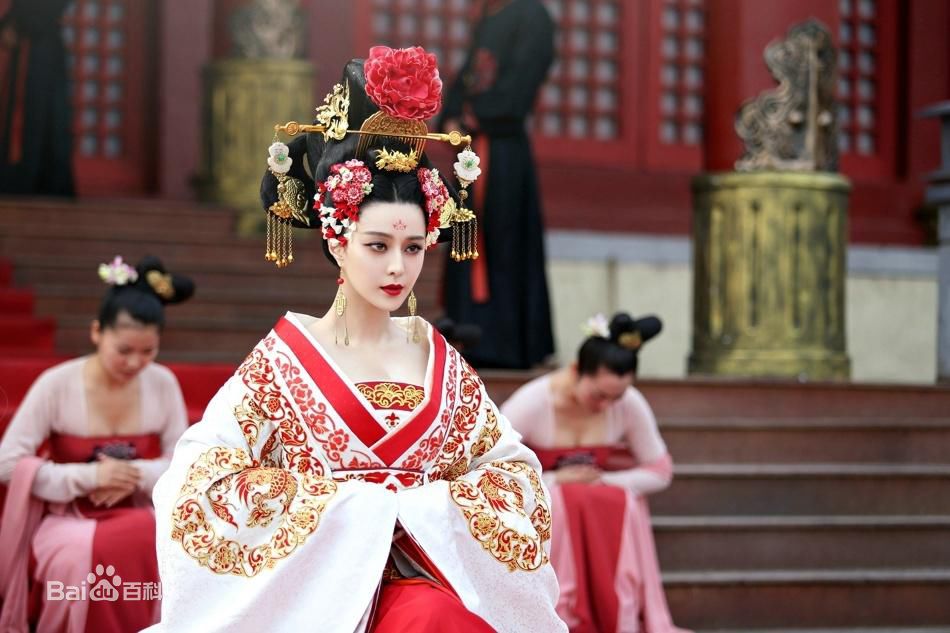
Fan Bingbing stars and produces the 2014 series about Wu Zetian’s rise from simple concubine to the sole female ruler of China. If my math is correct, the series was one of China’s most expensive to produce before The Story of Yanxi Palace, and you can see how well the money was spent. Everyone’s costumes are lavish, especially the higher ranking concubines. That budget is especially present in Wu Zetian’s clothing when she herself becomes a high ranking concubine and, of course, Empress.
The series is definitely a tour-de-force for Fan, who plays Wu Zetian from her teenage years all the way up until old age. Yet, she doesn’t overtake her scenes and allows her co-stars to shine, including Zhang Fengyi (who plays Emperor Taizong, Li Shimin), Aarif Rahman (who plays Shimin’s son, Emperor Gaozong Li Zhi), Janine Chang (who plays Able Consort Xu, Xu Hui), Zhang Ting (who plays Noble Consort Wei), Kathy Chow (who plays Pure Consort Yang), Zhang Tong (who plays Virtuous Consort Yin) and Sun Jia Qi (who plays Xiao Qiang).
2. Curse of the Golden Flower
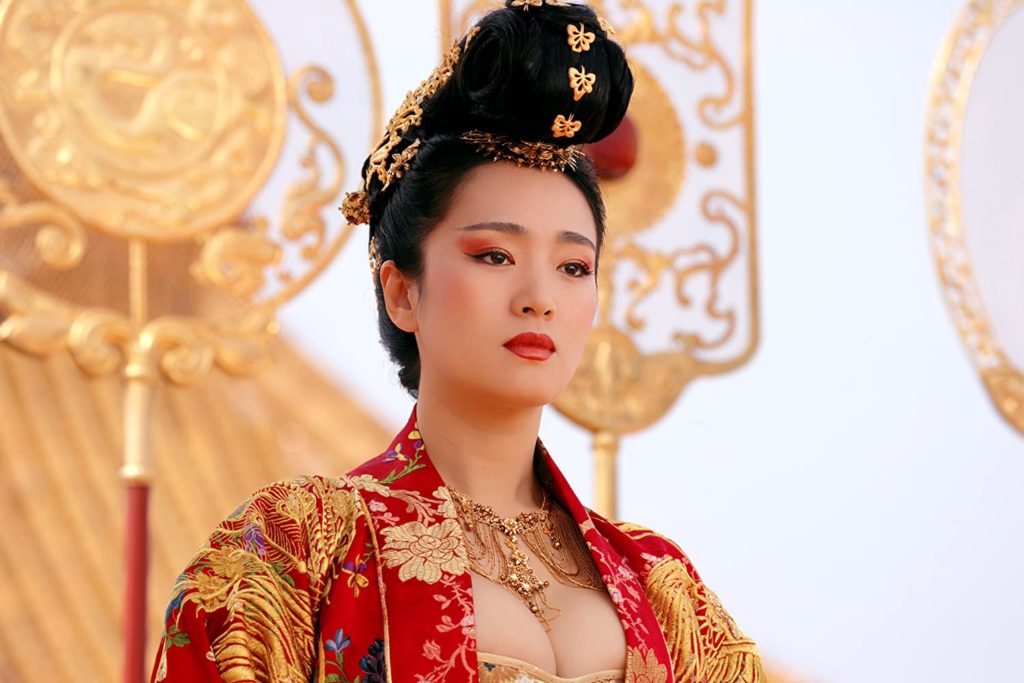
This 2006 film by Zhang Yimou was the most expensive Chinese film of its time, costing $45 million to make. Again, the budget is seen in its lavish attention to detail, including hiring hundreds of actors to portray the hoards of imperial servants keeping the Forbidden City running smoothly. Scenes were replete not just with people, but with hundreds of chrysanthemums, numerous food items, hundreds of costumes, gilded rooms and more.
The film, however, isn’t a drama with a happy ending. It’s a tragedy involving the Empress (Gong Li) and her terrible marriage to the Emperor (Chow Yun-fat). Sadly, her biological children, Prince Jai (Jay Chou), Prince Yu (Qin Junjie) and her stepson Crown Prince Wan (Liu Ye) are caught up in the fray in ways they couldn’t have imagined. While it’s set in the Tang Dynasty, when women could have freedoms that didn’t exist in other eras, it’s a sad irony that the woman with the most power in this film is the one that is possibly the most unhappy and most imprisoned.
3. House of Flying Daggers
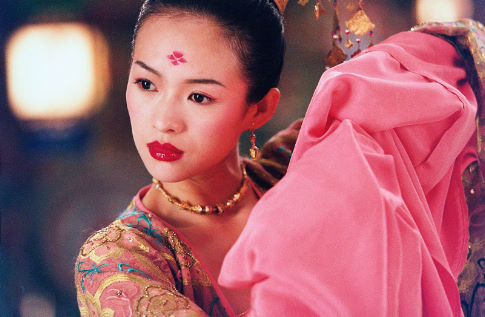
Before Curse of the Golden Flower, Zhang Yimou released House of Flying Daggers two years before. Starring Zhang Ziyi, Takeshi Kaneshiro and Andy Lau, the film is set in the waning days of the Tang Dynasty as rebel factions develop, ready to take power. One of them, the House of Flying Daggers, is a group that battles an immoral government. Two of the government’s police officers, Jin (Kaneshiro) and Leo (Andy Lau) are tasked with killing the group’s leader. Even though the assignment is already tough—no one knows who the leader actually is—it gets even tougher when Mei (Ziyi), a dancer thought to be the group leader’s daughter, comes into play.
The film is one that you have to watch a couple of times since it’s a film full of changing identities and allegiances. But it’s just what you would expect from a romance/mystery similar to that of a whodunit. The film’s focus on mystery is only second to its focus on love, which blooms between Jin and Mei despite the twists and turns that threaten to break them apart.
Which of these are you going to watch?
